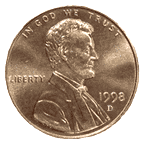Paying a debt with legal tender can land you in hot water

You may have heard, earlier this year, that you run the risk of being arrested if you pay for a purchase at Best Buy with two dollar bills.
Now, at least in Texas, there is precedent establishing that you can be held in contempt of court for paying a legal judgement in coins instead of bills.
The humble penny, properly known as a "one cent piece" is the most common form of currency. According to the United States Treasury Department:
You may be interested to know that the penny is the most widely used denomination currently in circulation and it remains profitable to make. Significantly, it is Congress that determines the denominations of coins that the Mint must produce and put into circulation. Each penny costs .81 of a cent to make, but the United States Mint collects one cent for it. The profit goes to help fund the operation of the United States Mint and to help pay the public debt. In 2000, this profit added up to about $24 million.
Also, while private businesses don't have to accept particular forms of legal tender as payment, federal law says that all United States money (coin and currency) are "legal tender for all debts, public charges, taxes and dues."
Except, apparently, sometimes in Texas...
—Michael A. Cleverly
Friday, July 01, 2005 at 22:52
If United States money is legal tender for all debts, then why are some business refusing cash for payment. This practice should be illegal, right? If one wishes not to use a bank check, credit card, other electronic payment or money order shouldn't they be able to pay in cash?
Auto insurance is mandated by or government, yet insurance companies are no longer accepting legal tender for payment. Is our government mandating that we can no longer use legal tender to pay our bills? In a court of law would you be found guilty for offering to pay your debt with cash and it was refused?
Tue, 05 Jan 2010, 14:47